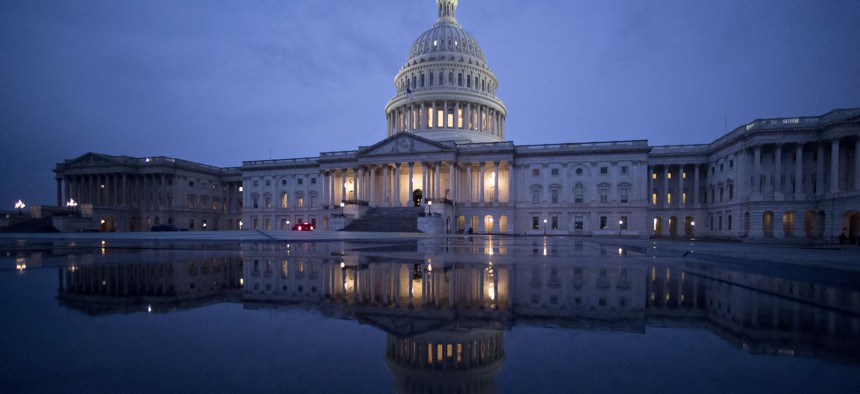Massive Spending Bill Clears Senate, Promising to Unlock Infrastructure Funds for States and Localities

The U.S. Capitol Building. Andrew Harrer/Bloomberg
The $1.5 trillion legislation would keep the federal government funded through September. It does not include provisions to grant more flexibility with state and local American Rescue Plan spending. Congress backed off proposed cuts to state aid—for now.
The U.S. Senate late Thursday night passed a $1.5 trillion spending bill that covers the remainder of the federal fiscal year, avoiding a government shutdown.
The vote, on the heels of the House’s passage of the measure on Wednesday, is significant for states and localities in that it allowed lawmakers to avoid passing another temporary spending bill that would have kept frozen $40 billion in transportation funding approved in the Infrastructure Investment and Jobs Act.
“With this package, we will be unlocking billions upon billions to fully fund the bipartisan infrastructure law,” Senate Majority Leader Chuck Schumer, a Democrat from New York, said before the vote.
“Now that IIJA has been funded, public works departments throughout America can finally get to work repairing, upgrading or replacing aging highways, roads, bridges, water and wastewater systems,” American Public Works Association CEO Scott Grayson said in a statement on Friday.
The $1.2 trillion infrastructure act, signed into law last year, requires that some of its transportation funds be appropriated by Congress before the Transportation Department can begin sending the money to states and localities.
Another continuing resolution to keep the government running would have simply left last year’s spending levels in place without providing the additional funds. The delay with the funding could have affected a range of road and transit projects.
In a disappointment for states and local governments, the spending deal did not include provisions that would have granted them greater flexibility to spend their aid dollars from the American Rescue Plan Act on infrastructure, including transportation projects.
The Senate’s passage of the spending bill, which funds the federal government through Sept. 30, lacked the drama seen in the House on Wednesday, much of which centered on controversy over a plan to claw back state government aid dollars provided under ARPA.
That plan took shape after Republicans pressed for spending offsets to cover the cost of $15 billion in new emergency Covid-19 funding sought by the Biden administration.
Democrats initially agreed to an arrangement to take about half of that sum from ARPA payments still due to 30 states.
But House Democratic leaders later scrapped the proposal after it was met with stiff resistance from some members within their party and from state officials. Democrats opted instead to pull the Covid-19 funding from the larger spending bill. The House plans to vote on that funding as a separate bill, possibly next week.
The clash over the state funding may not be over though.
Sen. Shelley Moore Capito of West Virginia, the top Republican on the Senate Environment and Public Works Committee, predicted during a call with reporters on Thursday that Republicans could try to restore the state cuts to pay for the Covid-19 emergency measure when it comes to the Senate.
Kery Murakami is a senior reporter for Route Fifty based in Washington, D.C.
NEXT STORY: Pennsylvania Senate Leader Proposes Lowering Gas Tax by One-third Through 2022






